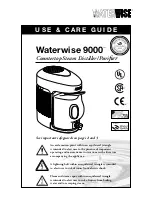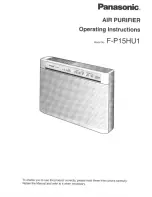
– 11
Illustration
until
Illustration
Remove the waste water tank from the appliance.
See Chapter "Emptying the waste water tank".
Clean the lid/separator and waste water tank with
tap water.
The waste water tank can also be cleaned in the
dishwasher.
After cleaning, put the waste water tank with lid
back into the appliance.
ATTENTION
The use of unsuitable cleaning and disinfecting agents
can damage the appliance and will void the warranty.
Note
Add cleaning or disinfecting agent as required.
When dosing the detergent and care product, fol-
low the manufacturer's dosage instructions.
To prevent foaming, first fill the fresh water tank
with water then cleaning or disinfecting agent.
To avoid exceeding the "MAX" fill level on the fresh
water tank, leave room for the cleaning or disinfect-
ing agent when filling with water.
Often, failures have simple causes and you can do the
troubleshooting yourself using the following overview. If
you are in doubt or if the failure is not listed here please
contact the authorized customer service.
Filter inlay is not inserted.
(see graphic for description of the device)
Remove fresh water tank and insert filter inlay with
rubber pin facing upwards.
Filter inlay is inserted the wrong way round.
Remove filter inlay and insert with pin facing up-
wards.
The suction hose is blocked by deposits of dirt.
Carefully remove the suction hoses from the suc-
tion head and basic unit.
Place the suction hoses in cold water for 10–20
minutes.
Clean suction hoses with a dull object and/or under
running water.
No water in the water reservoir.
Refill water
Fresh water tank does not fit properly in the device.
Insert the fresh water tank so that it sits snugly in
the appliance.
Cleaning rollers missing or not fitted correctly.
Illustration
Fit the cleaning rollers or turn them onto the roller
holder up to the mechanical stop.
Cleaning rollers are contaminated or worn.
Clean the cleaning rollers.
or
Replace the cleaning rollers.
Rollers are blocked.
Illustration
Remove rollers and check if an object or the power
cord has become stuck in the rollers.
Rollers are too dry.
Moisten the rollers/the device with 50 ml of water in
the park station.
There are parts (e.g. stones or splinters).
Illustration
Remove suction head lid and clean the suction
head.
See Chapter "Cleaning the suction head".
The suction ducts and slits on the suction head are
blocked.
Illustration
Remove suction head lid and clean the suction
head.
See Chapter "Cleaning the suction head".
Waste water tank is overfilled.
Illustration
until
Illustration
Empty the waste water tank right away.
See Chapter "Cleaning the waste water tank".
Waste water tank does not fit properly in the appliance.
Check whether the lid is fit securely on the waste
water tank.
See Chapter "Cleaning the waste water tank".
Separator is blocked.
Remove lid from the waste water tank and clean
the separator.
See Chapter "Cleaning the waste water tank".
The filter net of the waste water tank separator was
damaged during cleaning.
Renew separator.
Cleaning or disinfecting agents are not suitable for the
appliance or were dosed incorrectly.
Only use detergents and care products approved
by the manufacturer.
See chapter "Detergents and care products".
Follow the manufacturer's dosage instructions.
The initial moistening of the rollers was not used or was
not used long enough, meaning that the rollers are not
completely moistened (rollers therefore only clean par-
tially).
Illustration
Completely moisten rollers.
ATTENTION
Do not remove the handle from the basic unit once it has
been assembled.
The handle may only be removed from the basic unit if
the unit is sent out for service purposes.
Illustration
See illustration at the end of the operating instructions
Insert screwdriver at a 90 degree angle in the small
opening at the rear side of the handle and remove
handle.
ATTENTION
Please ensure that the connection cable between the
basic unit and the handle are not damaged.
Detergents and care products
Troubleshooting
Lack of roller moistening with fresh water
Appliance is not sucking up dirt
Rollers do not turn
Loud rattling when switched on
Rattling noise in the suction head
Suction power decreases
Appliance is leaking waste water.
Appliance leaves streaks behind on the floor
Removing the handle from the basic unit
19
EN
Summary of Contents for 1.055-401.0
Page 2: ...2...
Page 3: ...3...
Page 4: ...4...
Page 94: ...6 IEC 60364 FI 3x1 mm 94 EL...
Page 95: ...7 95 EL...
Page 96: ...8 0 C 96 EL...
Page 98: ...10 50 ml 5 n Off n Off MAX MAX n Off n Off 98 EL...
Page 99: ...11 n Off 200 ml K RCHER n Off 30 60 n Off n Off 60 C 99 EL...
Page 100: ...12 n Off n Off K RCHER MAX 10 20 100 EL...
Page 111: ...6 111 RU...
Page 112: ...7 IEC 60364 FI 3x1 112 RU...
Page 113: ...8 113 RU...
Page 115: ...10 250 60 50 5 MAX MAX 115 RU...
Page 116: ...11 200 K RCHER 30 60 116 RU...
Page 117: ...12 60 C MAX 10 20 117 RU...
Page 118: ...13 50 90 220 240 V 1 50 60 Hz IPX4 II 460 500 400 200 7 0 5 0 320 270 1220 118 RU...
Page 184: ...6 IEC 60364 3x1 184 BG...
Page 185: ...7 185 BG...
Page 186: ...8 0 C 186 BG...
Page 188: ...10 50 ml 5 MAX MAX 188 BG...
Page 189: ...11 200 ml K RCHER 30 60 60 C 189 BG...
Page 190: ...12 K RCHER MAX 10 20 50 ml 190 BG...
Page 191: ...13 90 220 240 V 1 50 60 Hz IPX4 II 460 W 500 U min 400 200 7 0 5 0 320 270 1220 191 BG...
Page 217: ...6 IEC 60364 F 217 UK...
Page 218: ...7 3x1 218 UK...
Page 219: ...8 0 C 219 UK...
Page 221: ...10 50 5 MAX MAX 221 UK...
Page 222: ...11 200 K RCHER 30 60 60 C 222 UK...
Page 223: ...12 MAX 10 20 50 223 UK...
Page 224: ...13 90 220 240 V 1 50 60 Hz IPX4 II 460 500 400 200 7 0 5 0 320 270 1220 224 UK...
Page 226: ...6 IEC 60364 FI 226 KK...
Page 227: ...7 3x1 227 KK...
Page 228: ...8 0 C 228 KK...
Page 230: ...10 50 5 MAX MAX 230 KK...
Page 231: ...11 200 K RCHER 30 60 60 C 231 KK...
Page 232: ...12 K RCHER MAX 10 20 50 232 KK...
Page 233: ...13 90 220 240 V 1 50 60 Hz IPX4 II 460 500 400 200 7 0 5 0 320 270 1220 233 KK...
Page 235: ...12 10 20 50 90 235 AR...
Page 236: ...11 MAX 236 AR...
Page 237: ...10 200 ON OFF 30 60 60 237 AR...
Page 238: ...9 ON OFF MAX MAX 238 AR...
Page 239: ...8 MAX 250 60 50 5 239 AR...
Page 241: ...6 IEC 60364 FI 3x1 241 AR...
Page 243: ......
Page 244: ......
Page 245: ......
















































